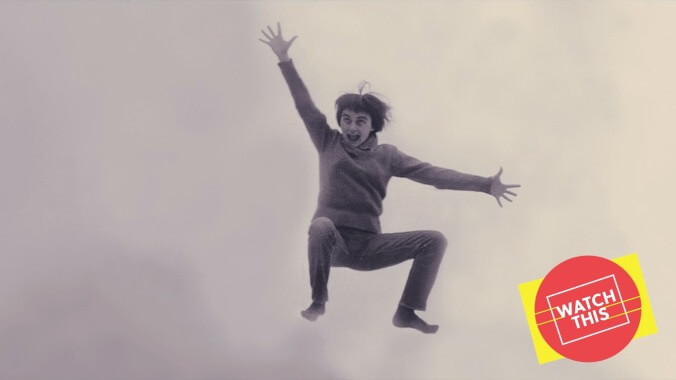Memories crash ashore in a moving auto-portrait from the late, great Agnès Varda
Film Features Watch This
Watch This offers movie recommendations inspired by new releases, premieres, current events, or occasionally just our own inscrutable whims. This week: In honor of the Netflix release of Sundance sensation Dick Johnson Is Dead, we’re looking back on other documentaries with deeply personal angles.
The Beaches Of Agnès (2008)
Before she rose to prominence as the “grandmother” of the French New Wave, the late Agnès Varda studied photography. She claimed that prior to her first feature, the penetrating marriage story La Pointe-Courte, she had not watched more than a handful of films. Whether or not this is true, one might see in Varda’s singular body of work the most basic motivations for picture-taking: the desire to preserve memories and to admire images of ourselves and our loved ones. These impulses converge in her 2008 memoir film, The Beaches Of Agnès, a self-portrait of the artist that does away with the customary nostalgia of autobiographical works and discards linear storytelling for something more raw and generous. Made in part as a celebration of her 80th birthday, Beaches tells the story of Varda’s life with a warm, rambling idiosyncrasy. She’s not interested in reliving the glory days; instead she demonstrates how past images help generate new ones.
At the beginning of the film, we see members of Varda’s crew arrange mirrors of different shapes and sizes in the sand; some face each other, some are tilted away. It’s as if the countless mirrors that Varda’s used in her films have all washed ashore—Cleo From 5 To 7 alone sees Corinne Marchand’s distressed singer observing herself in a conspicuous number of them. The display suggests that Varda’s self-image in the film will be a series of reflections within reflections, with the filmmaker looking at herself through different types of mirrors: her own work, her interests, her obsessions.
Narrating in voiceover, Varda weaves together memories by free-association, drawing on a medley of photographs, art, home videos, and film footage to animate her recollections. She remembers that in her first photography exhibit in 1954, there was a single photo of a heart-shaped potato. Decades later, in 2003, her exhibition at the Venice Biennale would be dedicated entirely to potatoes—she would even dress up as one for promotional purposes. The potato costume reminds her of her first official portrait, a mosaic-style painting that triggers a meditation on her love of medieval art, a key inspiration for La Pointe-Courte. Watching the film is like being guided by Varda through an enormous flea market. Yet the experience is never jarring or overwhelming. It’s more fluid and gentle, like a nice dream.
In one scene, Varda visits the Brussels home where she grew up, and declares that it all looks the same—the same view from the window of her childhood room, the same pear-shaped pond in the backyard. Rather than bask in memories of her childhood, for which she claims she has no fondness, Varda turns to the house’s new inhabitants, an older couple who take the opportunity to show off their impressive miniature train collection. Varda’s memory of the house is therefore enriched by her encounter with these funny, self-proclaimed “trainopaths.” Random tangents like these are testaments to the filmmaker’s insatiable curiosity and endless fascination with other people.
“I’m playing the role of a little old lady telling her story. And yet it’s others who I’m interested in filming,” she admits early on. We see pictures of neighbors, close friends, and children, of Harrison Ford and Gerard Depardieu before they hit the big time, of fellow New Waver Chris Marker in the guise of a cartoon cat. Long stretches of the film are dedicated to Varda’s late husband, Jacques Demy, a fixation that speaks to the impact of his absence. The Beaches Of Agnès reveals that she considered her life to be about more than strictly herself. It was also about the people, experiences, and images she loved and found interesting—the very things that inspired her to create. “If we opened people up we’d find landscapes,” Varda explains. “If we opened me up, we’d find beaches.”
Availability: The Beaches Of Agnès is currently streaming on The Criterion Channel, Kanopy, and Amazon with a MUBI subscription.
3 Comments
Varda is Life!
“It’s as if the countless mirrors that Varda’s used in her films have all washed ashore—…”Cool.
I kind of wish I hadn’t seen Varda By Agnes before I watched this, since I think this is probably the more elegant movie but some of the material was repeated in that later doc and the two blend together for me.